- Home
- Joan Lowery Nixon
The Other Side of Dark
The Other Side of Dark Read online
Praise for
The Other Side of Dark
Winner of the Edgar Allan Poe Award for Best Young Adult Novel
“A top-rate thriller.… Nixon has written another compelling page-turner.”
—Booklist
“The clever premise, the quick pace, and the determined protagonist should attract and hold readers.”
—School Library Journal
“The mounting suspense as the killer closes in will keep [readers] turning the pages.”
—Kirkus Reviews
Books by Joan Lowery Nixon
FICTION
A Candidate for Murder
The Dark and Deadly Pool
Don’t Scream
The Ghosts of Now
Ghost Town: Seven Ghostly Stories
The Haunting
In the Face of Danger
The Island of Dangerous Dreams
The Kidnapping of Christina Lattimore
Laugh Till You Cry
Murdered, My Sweet
The Name of the Game Was Murder
Nightmare
Nobody’s There
The Other Side of Dark
Playing for Keeps
Search for the Shadowman
Secret, Silent Screams
Shadowmaker
The Specter
Spirit Seeker
The Stalker
The Trap
The Weekend Was Murder!
Whispers from the Dead
Who Are You?
NONFICTION
The Making of a Writer
This is a work of fiction. Names, characters, places, and incidents either are the product of the author’s imagination or are used fictitiously. Any resemblance to actual persons, living or dead, events, or locales is entirely coincidental.
Text copyright © 1986 by Joan Lowery Nixon
Cover photograph © 2011 by Lynn Koenig/Flickr Select/Getty Images
All rights reserved. Published in the United States by Delacorte Press, an imprint of Random House Children’s Books, a division of Random House, Inc., New York. Originally published in hardcover by Delacorte Press, New York, in 1986.
Delacorte Press is a registered trademark and the colophon is a trademark of Random House, Inc.
Visit us on the Web! randomhouse.com/teens
Educators and librarians, for a variety of teaching tools, visit us at RHTeachersLibrarians.com
The Library of Congress has cataloged the hardcover edition of this work as follows:
Nixon, Joan Lowery.
The other side of dark / Joan Lowery Nixon.
Summary: Seventeen-year-old Stacy awakens from a four-year coma ready to identify, locate, and prosecute the young man who murdered her mother and wounded her.
ISBN 978-0-385-29481-2 (hardcover)
[1. Mystery and detective stories] I. Title.
PZ7.N65 Ot 1986 [Fic]—dc19 85046074
eISBN: 978-0-307-53947-2 (ebook)
Random House Children’s Books supports the First Amendment and celebrates the right to read.
v3.1
For Susan Cohen
with love
Contents
Cover
Other Books by This Author
Title Page
Copyright
Dedication
Chapter One
Chapter Two
Chapter Three
Chapter Four
Chapter Five
Chapter Six
Chapter Seven
Chapter Eight
Chapter Nine
Chapter Ten
Chapter Eleven
Chapter Twelve
Chapter Thirteen
Chapter Fourteen
Chapter Fifteen
About the Author
Chapter One
The dream is too long. It slithers and slips and gurgles deeply into midnight pools in which I see my own face looking back. It pounds with a scream that crashes into earth-torn caverns and is drowned; it surges with the babble of voices that splash against my ears; it whispers over words I can’t understand.
I have cried out in my dream. I have called, and ages ago someone answered.
“Mom? Mama?”
My voice violently shakes the dream. I open my eyes, as with a trembling roar the dream rushes from my mind and my memory.
I’m in bed, but this is not my room. Across the room is a statue of a nurse. Her pencil is held in midair above her chart; her mouth is open enough that I can see some bubbles of saliva on her tongue; her eyes are stretched and glazed.
“Where’s my mother?”
The statue comes to life. “Oh!” she says. “Oh, my, you’re awake!” Fluttering like a moth between too many lights, she pats at my bed, jabs at the controls that rest on the nightstand, and trots to the door. “I’ll be right back, Stacy,” she says. She takes a step toward me with palms up as though she wanted to hold me where I am and repeats, “I will. I’ll be back in a minute,” then scrambles through the door.
“Where’s my mother?” I call to the empty room. I try to sit up, but I can’t. It makes me dizzy. My mouth is dry, and there’s a spot on my left hip that is sore. What is happening to me? The blanket and sheet have slipped to one side, so I pull them up to my chest.
I gasp as my hands feel breasts that are rounded and firm. My shaking fingers slide past my waist, exploring, as the horror grows. I lift my head to look down, down at toes that lump the blanket near the foot of the bed, and the horror explodes in a scream. I am Stacy McAdams. I’m only thirteen years old, and I’m in the wrong body!
My room explodes with people, and they buzz like white-capped bees, reaching for my wrist, wrapping something around my left arm, and squeezing it until something beeps. And all the time I’m shouting, “Go away! I want my mother!”
A man with a trim blond beard sorts himself out from the confusion. He leans over me, studying me from under shaggy eyebrows, one hand gently stroking my forehead. “Stacy,” he says, in a voice that pours like dark molasses, “I’m Dr. Peterson. I don’t want to sedate you. I want to talk with you. Will you please stop shouting?”
I’m trembling so hard it feels as if the bed were shaking, and my voice is a raspy whimper. “Where’s my mother? I need my mother. I’m afraid.”
“Of course you are,” he says, “but you don’t need to be afraid. Everything will be all right.” His hand keeps soothing my forehead, sopping up the fear until the trembling is gone and the bed is still.
The nurses have disappeared, except for a short, round one standing by the door. For some reason I notice that her blue eyes are surrounded by crinkly laugh lines, so I don’t mind if she stays.
Dr. Peterson sits on the edge of my bed. My right hand disappears into his. “Now then,” he says, “the members of your family are being contacted. They’ll be here as soon as they can make it.”
“My mother—”
But he hasn’t finished. “You’re in Houston’s Braes-forest Medical Center, under my care. You were brought here after hospital treatment for a gunshot wound.”
I groan and screw up my face, trying to think, trying to remember.
“Relax,” he says. “It doesn’t matter now if you recall what happened. That can come later. The fact is that you’ve come out of what can best be called a semicomatose state, a type of coma.”
“Dr. Peterson, listen to me!” I clutch both his hands, and my voice grates like a rusty gate. “There’s something wrong. My body. It’s not right. It’s—”
“You were thirteen when you were brought here, Stacy. We’ve tried to keep you in a good state of health—as good as your condition would allow—so your body has grown and matured naturally.”
&
nbsp; “But I am thirteen!”
He shakes his head. “No, Stacy. You’re seventeen.”
“When my mother comes, she’ll tell you that you’re wrong!” I don’t want to listen to what he has to say. I try to tell him to go away; but I can’t talk and cry at the same time, and the tears get in my way.
He reaches to the table by my bed and hands me a fistful of tissues. They’re soft, but they’re heavy. My hands are heavy, my eyes are heavy, and the bed is a warm cocoon, shutting away the things I don’t want to hear and see. Deliberately I slide into sleep.
This time I wake slowly, scrunching up my eyes, stretching and twisting and arching the way I love to do. “You wake up just the way Pansy does,” my mother always says, as she shoos our lop-eared cat off the foot of my bed and tousles my hair. “Stacy, our other little cat.”
“Stacy? You’re awake?”
I open my eyes quickly at the sound of my father’s voice. “Oh, Daddy, you’re here! You’re here! I need you!”
He quickly wraps me in a long hug. His chest, under his smooth white cotton shirt, smells cozy and warm, but my cheek grows wet from his tears. I hold him away, puzzled. “Daddy? I’ve never seen you cry.”
There are hollows under his cheekbones, and his brown eyes seem strangely faded. His hair is thin on top. He’s my father, but he isn’t my father—at least not the way he was yesterday.
“Daddy, the doctor told me I’ve been here four years, that I’m not thirteen, I’m seventeen. It’s not true, is it?” But as I study my father’s face I know it has to be true, and I gasp, “How did it happen to me?”
“Nobody completely understands it. Not really. You were shot, and the bullet did something to you that caused a kind of coma; but you didn’t need life support. You were breathing on your own, and your vital signs were good. It’s just that you were in a world of your own, and you couldn’t or wouldn’t leave it. The people here were able to help you sit in a chair and walk and even feed yourself if someone was with you. You have a physical therapist who has worked with you on exercises every day.”
“I don’t remember any of this.”
He pats my hand. “I know, sweetheart. Mentally you weren’t responding.”
“Then why did I wake up?”
He shakes his head. “No one knows exactly. They can just guess. You fell and cut your hip. Then last week you developed an infection in the cut, and the doctors treated it with antibiotics and even some minor surgery. They think that maybe it was the reaction to the anesthetic that brought you out of the coma. I’m doing a bad job of telling you about it, I guess. Dr. Peterson can do a better job of explaining it to you than I can.” My father wipes his cheeks with the back of one hand, then spots the box of tissues, wads one, and rubs it over his eyes.
The door opens, and a familiar face peers through. Donna’s the original. I’m the carbon. “That beautiful dark hair, those tilted green eyes,” Dad would say, and wink at Mom. “We’ve certainly got lovely daughters, Jeanne.”
Donna shyly whispers, “Stacy?”
“Donna!” I hold out my arms to my sister, laughing as she hurries through the door. She clumsily bumps against the end of the bed as she rushes to hug me.
“I like your hair that way,” I mumble against her ear. “But don’t ever scold me again about munching Twinkies. You’re getting fat, big sister!”
She sits back and beams at me. Her tucked-in smile reminds me of so many times when she has been where I couldn’t follow: her first dance; the red-haired basketball player she thought she was in love with when she was sixteen; the dorm friends she wrote about when she started college.
“I’m pregnant,” she says. “In just two months you’re going to be an aunt.”
My mouth is open, and I know I’m making owl eyes, but I don’t know what to say.
“Last year,” she says, “Dennis and I were married.” She glances at Dad from the corners of her eyes. “I had to promise that I’d get my degree, and I will—in May of next year. See, Dad, I’m keeping the promise.”
“But I wasn’t there!” I wail. “I was going to be your maid of honor. You always told me I could be.”
She holds the palm of my hand up against her cheek. She’s still smiling, but I see a terrible sorrow in her eyes. “Stacy, love, things were—well, so different. Dennis and I didn’t have a big wedding. Just a few people and the priest.”
“But you always said when you were married, you’d have a train six feet long! And loads of bridesmaids, all in blue, and wear the pearls that Grandma left to Mom.”
Dad clears his throat as though he were about to say something, but Donna interrupts. “It doesn’t matter,” she says. She shakes her head, lays my hand gently on the blanket as though it were made of fine china, and awkwardly gets to her feet, one hand pressing the small of her back. “I can’t wait till you meet Dennis. Dennis Kroskey. Hey, you’ll have to get used to my new name!” She walks to the door, turning to say, “He’s patiently biding time out in the hall because I wanted to see you first.”
Dennis enters the room, and Donna props open the door. He’s tall, with skin tanned the color of his reddish brown hair, and he has a summer smell of lots of soap and showers. I’ll bet he plays tennis.
“I’ve met you before,” he says, “when you were—sleeping.”
“You came to see me?”
“Lots of times, with Donna. She introduced us, and she talked to you about our wedding, just in case you could hear her. Your family talked to you about everything that went on.”
“Maybe that was part of my dream.” There were so many voices, and they came and went for so long a time. I can’t remember what they said. I don’t want to remember. He’s smiling, too, so I hurry to add, “Donna told me about the baby. I’m glad you’re going to have a baby.”
“So are we.” He hugs Donna in such a special way that I ache right in the middle of my chest. I wasn’t there when she fell in love and when she got married and when she first found out she was going to have a baby. I have to get used to all this at once, and it makes me feel lonely and shut out, no matter what they tell me.
I take a long breath, trying to keep things going right. “I’ll baby-sit for you whenever you want. I guess I should say I’ll baby-sit if Mom gives me a chance. She’ll be so crazy about that baby the rest of us might not get to hold it until it’s old enough to go to school.”
No one laughs. No one answers. There’s a funny kind of chill, like when you open the freezer door on a hot day and the icy air spills over your feet. “When’s Mom coming?” My words plop into the cold. “Where is Mom?”
Dr. Peterson is suddenly there, head forward, his shaggy eyebrows leading the way like the prow of a ship. “Donna and Dennis,” he says, “we’ll keep your visit short. Why don’t you come back to see Stacy tomorrow?”
Donna quickly kisses me, Dennis pats my feet, and they disappear before I can protest. The door swings shut, and the room is silent.
Dr. Peterson lifts my wrist in strong fingers and looks at his watch.
I try to tug my arm away from him. “You interrupted,” I tell him. “I was asking a question, and I want an answer!”
“Take this,” he orders. He hands me a pill and a glass of water from the table.
“Not now.”
“Yes, now.”
As I obey, quickly gulping the pill, he nods at my father, and Dad leans forward, holding my hand again. His skin is clammy and hot, and he has to clear his throat a couple of times before he can talk.
“Honey,” he says, “all along we’ve had faith in you. We knew you wouldn’t give up. Remember even when you were just a little girl and you’d be so independent and set on getting your own way? You’ve always had a lot of courage, Stacy, and—”
“Daddy, tell me now. Where’s Mom?”
He is hurting, and I can’t help him. I don’t even want to help him. My toes and fingers are warm and relaxed, and a numb feeling is seeping through me. It’s like the drowsy wa
king-sleeping in the early morning after the alarm has been turned off. But I’m awake, and I hear what he’s saying.
“The day you were shot—” His words are jagged pebbles on a dry, dusty road, and his voice trips as he stumbles through them. “Your mother was shot too. But Jeanne—oh, Stacy, Jeanne was killed.”
“No,” I answer, because I don’t believe these strange words that are as hollow as shouts inside a tunnel, ringing and echoing and sliding away. My father is gray and crumpled, and he’s crying. I try to pat his hand with fingers that are too heavy to lift. Something is wrong. Maybe it’s still part of the dream, and I’ll wake up and tell Mom about this crazy dream while we’re making breakfast, and she’ll give me a little swat on my backside and say, “For goodness’ sake, stop talking and eat, or you’re going to be late for school.”
“Tell me everything that happened,” I murmur, wanting the dream to be complete. “No one has told me.”
It takes a few minutes for my father to answer. His voice seems farther away, but I clearly hear every word. “Donna said you were going to the backyard to sunbathe,” he begins.
I remember. I was wearing my new red shorts, and I had Pansy with me. There wasn’t any smog, and it was a golden day, and I wanted a head start on my tan.
“We don’t know what happened next,” he says. “Donna went to the grocery store down at the boulevard to get a couple of things. She came home and found that the front door was unlocked. Your mother was lying in the den. Donna said she screamed at Jeanne to get up, but she didn’t move. Donna telephoned for an ambulance, and then she remembered you. She ran outside and found you lying on the grass near the back porch steps.”
I hear the words, but I don’t feel them. I am in a tunnel, but I can still hear what Dad says. Except that his words get mixed up with the other sounds and voices that are in my head.
There’s a weird noise, like a yelp. It’s coming from inside our house.
But a hand begins stroking my forehead. A deep voice says, “Go to sleep now, Stacy. Relax and sleep.” I want to open my eyes, but I can’t.
I run toward our back porch, and the screen door bangs open. Somebody runs out. He stares at me.

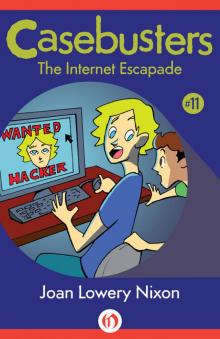 The Internet Escapade
The Internet Escapade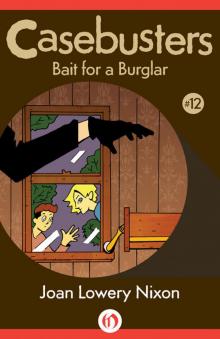 Bait for a Burglar
Bait for a Burglar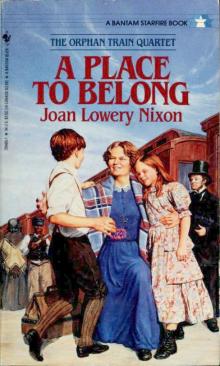 A Place to Belong
A Place to Belong Nightmare
Nightmare Sabotage on the Set
Sabotage on the Set The Other Side of Dark
The Other Side of Dark Whispers from the Dead
Whispers from the Dead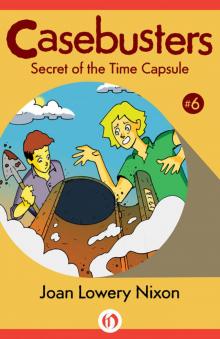 Secret of the Time Capsule
Secret of the Time Capsule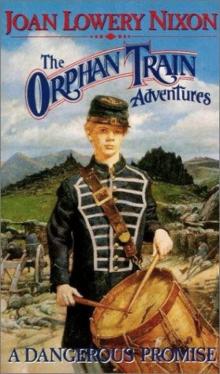 A Dangerous Promise
A Dangerous Promise Laugh Till You Cry
Laugh Till You Cry Spirit Seeker
Spirit Seeker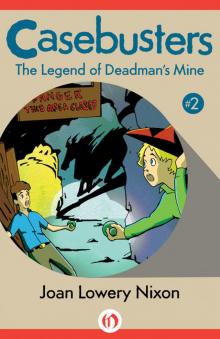 The Legend of Deadman's Mine
The Legend of Deadman's Mine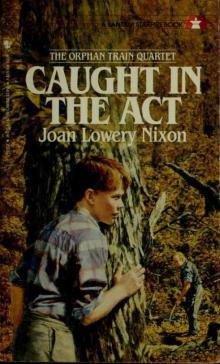 Caught in the Act
Caught in the Act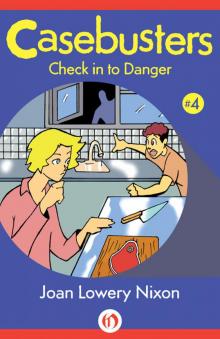 Check in to Danger
Check in to Danger Ellis Island: Three Novels
Ellis Island: Three Novels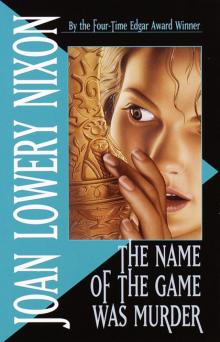 The Name of the Game Was Murder
The Name of the Game Was Murder The Haunting
The Haunting Lucy’s Wish
Lucy’s Wish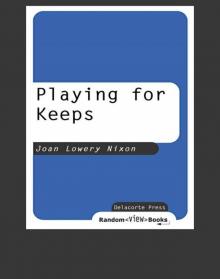 Playing for Keeps
Playing for Keeps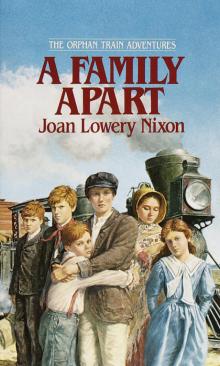 A Family Apart
A Family Apart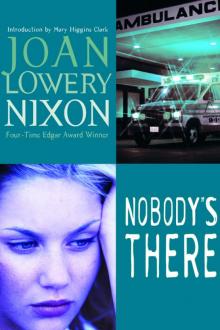 Nobody's There
Nobody's There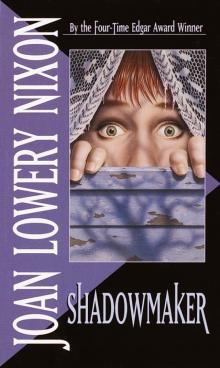 Shadowmaker
Shadowmaker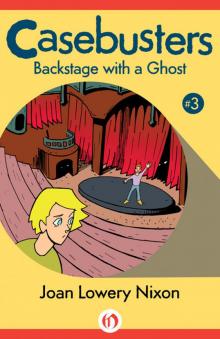 Backstage with a Ghost
Backstage with a Ghost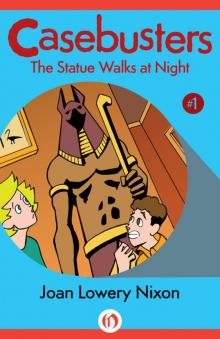 The Statue Walks at Night
The Statue Walks at Night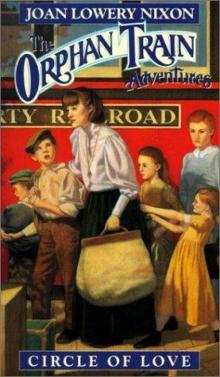 Circle of Love
Circle of Love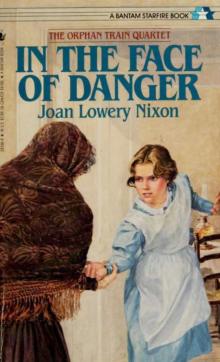 In the Face of Danger
In the Face of Danger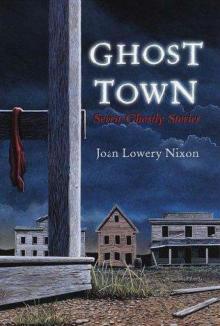 Ghost Town
Ghost Town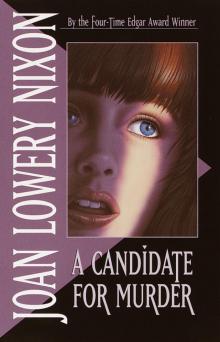 A Candidate for Murder
A Candidate for Murder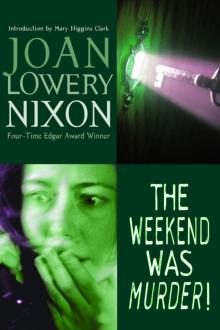 The Weekend Was Murder
The Weekend Was Murder The Island of Dangerous Dreams
The Island of Dangerous Dreams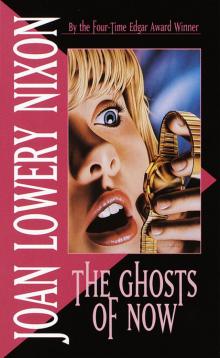 The Ghosts of Now
The Ghosts of Now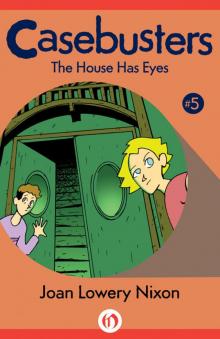 The House Has Eyes
The House Has Eyes The Dark and Deadly Pool
The Dark and Deadly Pool Keeping Secrets
Keeping Secrets Secret, Silent Screams
Secret, Silent Screams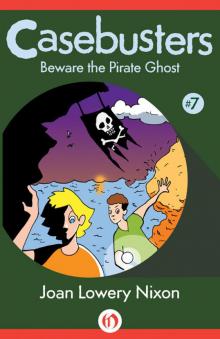 Beware the Pirate Ghost
Beware the Pirate Ghost Search for the Shadowman
Search for the Shadowman Haunted Island
Haunted Island